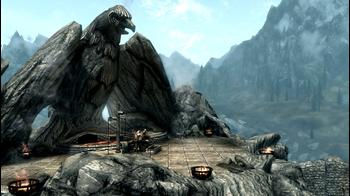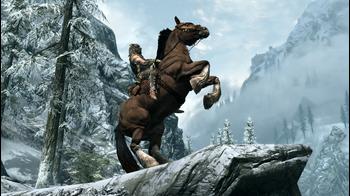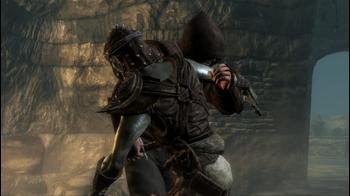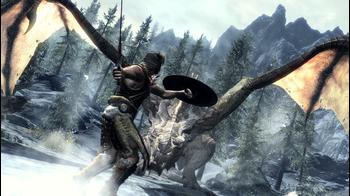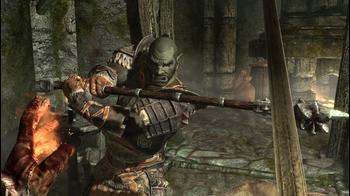
The Elder Scrolls V: Skyrim Review
Reviewing an Elder Scrolls game isn't a particularly easy process compared to some games. Even in the RPG genre, reviewing something like Final Fantasy XIII or Mass Effect 2 just has you ploughing through a main storyline with side quests offering a change in flavour and style - but in Elder Scrolls, the content outside the main quest is more of the meat of the game than the core storyline.
Half of the joy of what Skyrim offers comes in the form of its new world, the mountainous, snowy province of Tamriel for which the game is named. The world of Skyrim offers a rather stark change from Oblivion in a number of ways, though perhaps the most striking is the way that towns are now handled.
While Oblivion was populated with a few large-scale castle towns Skyrim has instead opting for a larger number of smaller settlements. This simple choice alone helps to make the game feel significantly more varied than Oblivion was, and the loss of massive cities like Oblivion's Imperial City isn't felt particularly heavily.
Characters bustle about the world living their 'lives', and while you'll hear people repeat the same thing over and over again listening carefully to conversations you hear can sometimes unlock extra quests, and while if you get close enough you can clearly see the cogs turning from afar the citizens of Skyrim act in a manner that helps to make the world feel more convincing and alive.
The open world premise still rules supreme, but small changes are the name of the game, adding up cleverly to refine the experience of exploring in an open world game of this kind. Another notable change sees dynamic weather conditions debut in the series, meaning that you could see a blizzard whilst atop a mountain or scorching sun whilst travelling more flattened plains - or even the reverse.
Even though weather and town sizes have gameplay implications there are still changes that are more important from a gameplay perspective to the open world - most notably the differences in how and where the game loads. Cities are part of the main overworld now, meaning a load is not required to enter them. This saves an absolute ton of time and allows you to immediately fast travel from within city walls if you want to, which is a massive convenience.
Buildings, dungeons and other major landmarks are still hidden behind a load time, but merely pulling the city and town hubs out of separate areas and into the overworld helps to push the feeling of cohesion between the different aspects of the game's world - seeing a load screen between the door of a house and its innards are one thing, but approaching the large gate of a TARDIS-like city that loads and then appears to be bigger on the inside was a pet peeve of mine in Oblivion - and that's without even mentioning how long the loads took in that game.
Loading is still a little bit of an issue in Skyrim, though the game has different ways of handling that depending on what platform you're on. PC owners will of course see the quickest loads, while PS3 owners will face a mandatory 5.5 gigabyte install in order to speed the game up. Xbox 360 owners don't have a forced install but the game does make use of heavy and frequent hard drive caching, meaning if you have a hard drive the more of the game you play the faster it will load in the future. The game can also be optionally installed in full to the hard drive as with all 360 games, and this is how I'd recommend you play.
Your introduction to the world of Skyrim is a harsh one, but one that also sets the tone for a game that can run heavier on the scripting and set-pieces than any previous open-world Bethesda release. You’re in a prison cart that's trundling you to your death for an unnamed crime, fellow prisoners and background dialogue fill in some of Skyrim's volatile political situation for those who listen carefully.
Before long you're asked by a guard to introduce yourself - right before they're ready to cut off your head - and it's then that you jump into character creation. The usual suite of Elder Scrolls races and fantasy tropes are available from the archetypal lizard men that are the Argonians to Elves and more traditional humans. There are a decent number of character customization options on offer after you've chosen race and gender, the usual array of sliders and settings adjusting the size of features until you're happy with it.
I went back to Oblivion to double check, and it's no surprise that so many years on the character creator is indeed significantly improved over the one in that game - but it still does feel a little superfluous. It doesn't allow for creations as outlandish as some other games, but that isn't actually the problem - the fact that you never see your character is. Skyrim is once again designed to be played from the first person - and even though the third person mode has been improved, the stat boosts from wearing a helmet mean you'll be covering their carefully-crafted face up anyway.
If character creation is still your bag for reasons of immersion and role-play then Skyrim's will work great for you, but past their face and build so much of how your character looks will always be throttled by the equipment available to you and your in-game stats. That's typical Elder Scrolls, and so I personally spent less time on the physical appearance of my character - though that definitely didn't stop me embarking on a game-wide search for the best possible looking armour for my hero.
After generating your character you'll see another character have his head thrust onto the block for execution, and this'll give you a glimpse at something new - the dude's head gets cut clean off, landing gruesomely in a basket below. That’s possible in combat, but you don't get much time to ponder it, as you're about to meet the same fate - and then a Dragon attacks.
The dragon attack becomes a more bombastic version of the prison break scenes that set up Oblivion, providing the player with a reason to start anew and be cast out into the world largely alone. As mentioned earlier, the intro features more deliberate scripting than probably any other Elder Scrolls game, with the game occasionally wrestling away control to direct your eyes to the dragon as it lays waste to the town, and with your character pushed around by guards.
The scripting works well, and in first person is somewhat reminiscent of when Call of Duty wrests control from you for a vital story sequence. It all works great from the first person, and while Skyrim's third person animations and look has been vastly improved over past Bethesda games it's still clear that unless you have a major issue with it you'll be wanting to play this game in first person so it looks its best. Something about the third person animation just looks lacking compared to proper third person games.
This new scripting of story events is a major help in making the story more than just watching characters talk. The opening hits hard, and from there the game continues to leverage that in major story missions. This all helps to give certain important story moments more punch, but Skyrim clearly puts a pride of importance on taking control away from the player as little as possible.
Once you're free you quickly find a weapon and some armour and then the game starts to resemble Elder Scrolls a ton more. In the first person you'll be blocking and attacking, carefully managing three meters - Health, Stamina and Magicka - which determine how long you can stay alive, how much you can swing swords or sprint and how much magic you can use and of what strength. It's simple and pure.
Other systems from prior games like stealth make a return almost untouched, with statistical bonuses under the hood of the game to damage for things like sneaking up on an enemy.
There are evolutions to the core combat past that, though. Animation priority has clearly been increased, meaning things like timely shield thrusts will have a greater effect. Incredibly welcome is the ability to dual-wield, meaning you can hold an axe in one hand and cast spells from the other, opening up the option for Battle mage-like classes for the first time.
One purely cosmetic but cool change is the cinematic kill system, clearly inspired a little by Fallout 3's VATS. I never quite did figure out the exact parameters required to trigger one, but in certain circumstances a cinematic kill can happen, seeing your character shank a dude in a cinematic third person angle. These sometimes look cool but sometimes also display some of that lovable-but-flawed open world hokeyness you've come to expect - character models acting in weird ways, swords sometimes not quite sticking out of dudes from the correct angle - that kind of thing.
The big evolution from the previous game actually comes thanks to a plot device - your character being Dragonborn, and thus able to defeat dragons and absorb their souls. Dragon Souls can then be used in tandem with ancient script to learn shouts, a magical technique where you project your voice with such force of will that it can damage or cause other things in the world to change.
The game funnels you towards your first shout, a simple one which shoves enemies back like a force push, but past that Skryim lets you discover more for yourself. The main story path will push you in the line of several more, but there's plenty besides hidden at the bottom of the game's dungeons. Once you've absorbed the information of a shout from these places you'll then have to slay a dragon and use their soul to properly learn the manoeuvre.
Shouts are different from regular magic because they don't use magicka and can be used with a press of a single button - meaning you can use a shout midway through sword combat without having to worry about swapping out your shield. There's something very satisfying about using a shout to unsettle an enemy from a block and then lay in with your sword. They're not all support-style powers - breathing fire is more offensive in nature, obviously, but is also one of my favourites.
Slaying dragons is one of the most exciting things in the game, not least because of how natural the dragon fights feel. While the first felt disappointingly scripted, from then on in dragons would descend on me for no reason whilst in the middle of a side quest. They'll gobble up NPCs, move about with a surprising amount of free will, and generally look bloody awesome. These battles don't feel tiresome or boring, even later on - which is great news.
Levelling your normal powers in Skyrim is based around skills rather than classes. When you actually level up properly you'll get to choose to have a stat increase to your health, magicka or stamina and also gain a 'perk' which can be spent on one of 16 simple branching skill trees. These trees cover everything from lock picking to specific weapons and even crafting, so you can really push your character in the direction you want.
The idea behind the system is to give players a greater degree of control - regardless of what race you pick, you'll be able to plough points into whatever class style you like. Redguards make more natural warriors, but if you wish to spec one as a mage you totally can through this system.
Levelling individual skills is achieved by doing whatever it is you want to level. Picking locks successfully will improve that stat, hitting dudes will increase damage output with the type of weapon you're using, and buying and selling things will increase speech - it continues from there. There's other ways to level, though, including books littered around the game world which will give a stat boost or friendly NPCs who can train you in their area of expertise up to 5 times per overall level at a gold cost.
This is all enough to get through the main story, but those who choose to dig a little deeper will be rewarded. It's definitely worth crafting in Skyrim, with the game boasting individual stats for Blacksmithing, Alchemy and Enchanting, all of which can create new gear or improve existing gear.
The inventory system has been made easier, quicker and more fun to use without losing any of the depth. The slick menus do a great job of pushing the important information about weapons and equipment to the forefront, and shortcuts make it very easy to switch between important items on the fly. Encumbrance is a necessary evil but still a personal pain in the ass for me, being the loot fiend I am.
The levelling in Skyrim is simplified but it works well and feels no less open and customizable than Oblivion, while other areas like crafting are so heavily improved they provide more options. Mix that in with a more varied world, well over 100 different custom dungeons without a copy-and-paste design and a ton of side quests including the return of favourites like The Dark Brotherhood, and you've got a hell of an engaging game.
That core storyline is important and presented better than any other storyline in the Elder Scrolls series, but the star of the show here is everything else going on - every character, NPC and side quest that helps to weave Skyrim into a believable tapestry of a world torn by alliances, wars and the arrival of the dragons.
Is Skyrim perfect? Not at all. The first person combat can still too often feel like two characters bouncing off each other, but thinking carefully about how you play can stop that from happening. Strange little bugs and flaws are apparent often - but by now it's almost part of the charm.
Indeed, it almost wouldn't be a Bethesda game without sometimes-underwhelming performance, strange bugs, insane NPCs and all those other open world flaws and gameplay contrivances, but it speaks to the quality of the rest of the game that once you get more than an hour into Skyrim that all just won't matter. I was mad when I got stuck in the floor of a dungeon once and had to reload a save ten minutes prior - but I was also so excited to continue playing that the anger didn't last.
With Skyrim Bethesda have truly succeeded in crafting not a sandbox, but a world. It's a world that's more exciting to live and play in than any other they've created. It's a game where the world is the greatest character of all, reigning supreme over all others. Skyrim's world is beautiful.
That, combined with exciting gameplay, open-ended character development and engaging story threads is all it takes to be truly great - but it all starts with the world. From that, through that, the game itself is beautiful too.
